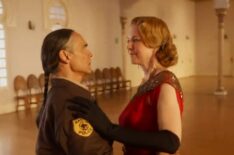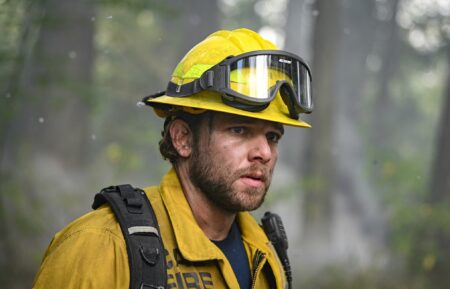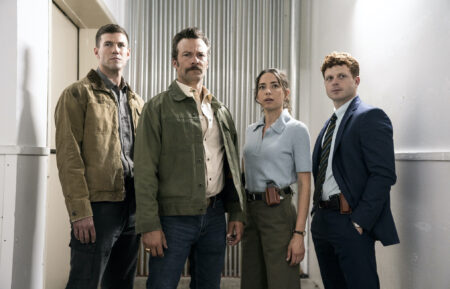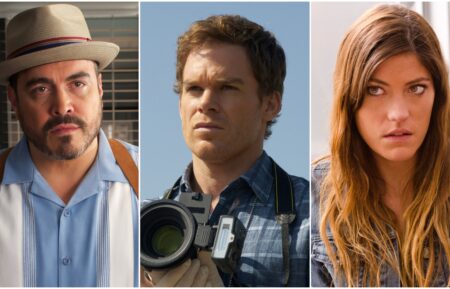‘Dark Winds’ Boss on Joe & Emma’s Finale Ending, Plus Early Season 4 Teases
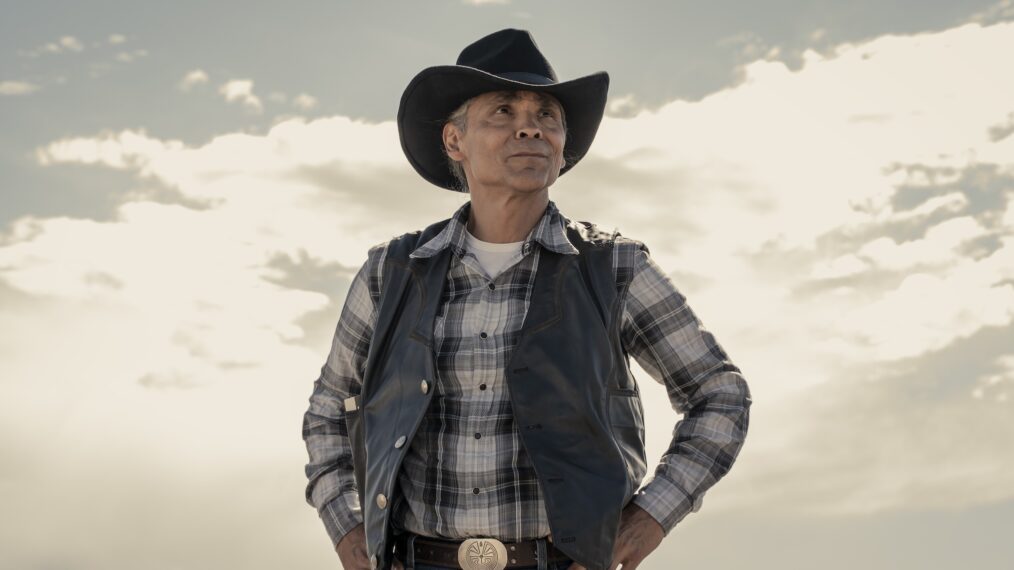
Spoiler Alert
[Warning: The below contains MAJOR spoilers for the Dark Winds Season 3 finale “Béésh Łį́į́ (Iron Horse).”]
If ever a title fit a season of this show, Dark Winds is it. The third season finale of the wonderfully layered crime drama centered on Navajo cop Lt. Joe Leaphorn (Zahn McClarnon), his colleagues, and his enemies in the 1970s encompassed a legendary Navajo monster, the murders of innocents, trafficked drugs and humans, unexpected betrayals, a terrifying hitman, and an evildoing archaeologist in an environment both stark and magnificent.
Most heartbreaking, however, is the rupture between Joe and his beloved deeply spiritual wife Emma (Deanna Allison). No matter how much she loves her husband, she believes that his facilitating the death of B.J Vines, Season 2’s villainous tycoon who deliberately caused the oil well explosion that killed their son Joe Jr,, then lying about what he did, brought dishonor and evil spirits to their home.
Read on for some insight into the season finale from Dark Winds showrunner John Wirth and some sneak peeks into Season 4.
What can you say about the possible dissolution of the decades-long devoted Leaphorn marriage? It was painful to watch their split.
John Wirth: One of the things that I’ve been really interested in writing about and portraying in this television show is the marriage between Joe and Emma Leaphorn. It would be like having a devout Catholic and if not an atheist, an agnostic in a marriage. She is a traditional Navajo woman. He was raised with the traditions, but he’s not observing them as closely as she does or as she would like him to. And I think part of her challenge is she sees that her husband is living out of balance. There’s a Navajo word called Hozho, which means roughly to be in balance, and in order to be in balance, you have to live the Navajo way and also go to ceremony. It’s a fourth cousin to the idea of going to confession when you go to ceremony. You deal with a medicine man or woman who helps you get back into balance and the way you need to be, to live a virtuous Navajo life. So he is way out of balance by the nature of his job and his involvement in the killing of B.J. Vines. His keeping it a secret from her has festered within him. [The torment] is exacerbated by FBI Special Agent Sylvia Washington [Jenna Elfman], who’s investigating the murder of BJ Vines. Washington added pressure to the whole situation especially with Emma Leaphorn, which is crushing to her and her own sense of balance.
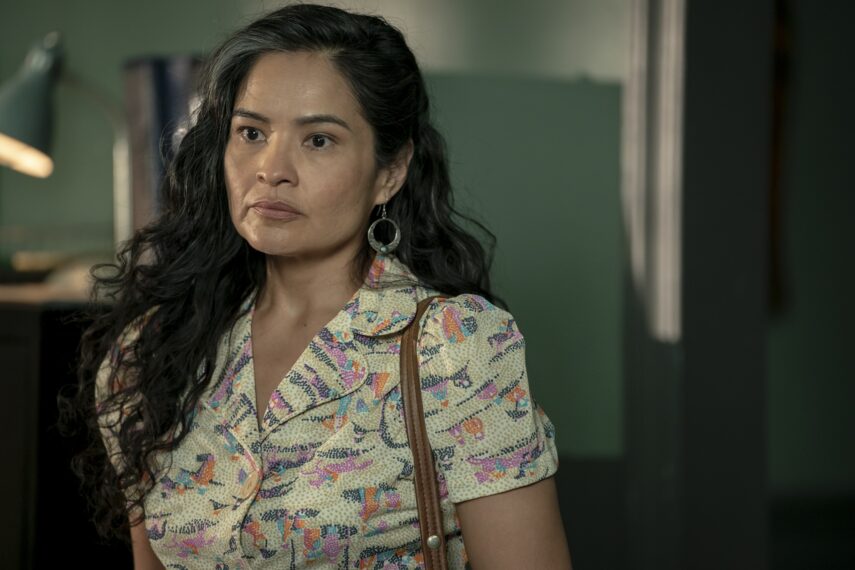
Michael Moriatis / AMC
Joe was hoping he could deal with the aftermath of what he feels he had to do with B.J. Vines and not have it implode his marriage. It’s like you’re in a marriage and you kind of have blinders on thinking, “I just can keep doing this and not fly an airplane into the side of the mountain.” And then one day, you wake up and you’re a half a mile from the side of the mountain, going full blast right toward it, and you realize, “Oh, there’s no way to get out of this.” So I think to say it’s life changing is an understatement. It’s his worst nightmare come true when she leaves him over this.
You decided to end the season with Washington handing Joe the tape of his wife answering her questions and his heartbreaking reaction. Can you talk about that?
I found that very moving that he would have to hear his wife’s words, which were not meant for him to hear. And I think it’s a very interesting decision on Sylvia Washington’s part to give him that tape. I think it tells us that Washington cares about him in a way that was unexpected. I really struggled trying to write the scene where Washington comes out to see him when he is building the garden gate for his wife who’s no longer living with him and she tells him to listen to the tape. It kind of sets you free, is her message. And I remember standing there on set watching the director Chris Eyre and Zahn filming that scene, and it occurred to me in the moment that maybe he should stop the tape when he hears her say, “I hope someday I can forgive him.” It’s important that she says, “I can forgive him,” as opposed to “Can you forgive me?” And I thought that would make him stop and he’d want to play it back saying, “Did I hear that? Yes, I heard it.” And then he plays it back again because in a sense, he’s torturing himself for having gotten to this place in the marriage.
Is there anything in the tape that might offer some hope for reconciliation between Joe and Emma? It would be so sad if they break up.
I wrote it and I don’t feel it’s hopeful. But you never know in life. Things happen that you don’t see coming and other things heal that you don’t think are healable…
In a number of episodes, Joe’s guilt led him to believe he was being haunted — and hunted — by a “Ye’iitsoh” a punitive tribal spirit, which, of course, turned out to be Dr. Reynolds (Christopher Heyerdahl), an archeologist who would murder anyone who could reveal his ongoing fraud at an ancient tribal site.
Joe Leaphorn’s got a wonderful line early in the season when he goes to a [tribal medicine woman] and he says in Navajo, “Man and monster are separated by a line.” That was another moment where I kind of cooked that up on the set. I went over to Zahn who had said, “I’m afraid I’ve crossed that.” And I asked him to then add, “I have crossed a line.”
Early on the season, two teen boys who had worked on an archaeological dig aimed at proving a relationship between an ancient indigenous tribe and the Navajos, headed by Dr. Reynolds went missing. Ernesto Cata was soon found dead and his best friend, George Bowlegs (Bohdi Okuma Linton), disappeared after they stole pieces of arrowheads that would have exposed Reynold’s seeming fame-making discovery was a fraud. To prevent exposure, Reynolds had killed Ernesto, badly wounded Joe Leaphorn and in the finale, his assistant Teddi Isaacs (Carly Roland) and was hunting George. Leaphorn, still in bad pain, and his deputy Jim Chee (Kiowa Gordon) were on his trail. Can you talk about how that ended at a train station?
Joe Leaphorn deduced that George was going to try to reconnect with his mother who lives in Reno, and the obvious way is by train. And George had been to the trading post trying to trade things to get money to buy a train ticket. [George had also stolen cash from Leaphorn’s wallet.] Joe and Chee knew that Reynolds found George’s campsite and a train schedule was in his backpack and they had to get to George before Reynolds shows up, so the setup for the finale was our guys undercover staking out the train station for George and Dr. Reynolds. The chase was on. [After a number of near misses and both Joe and George in trouble, Chee took the bad guy down.]
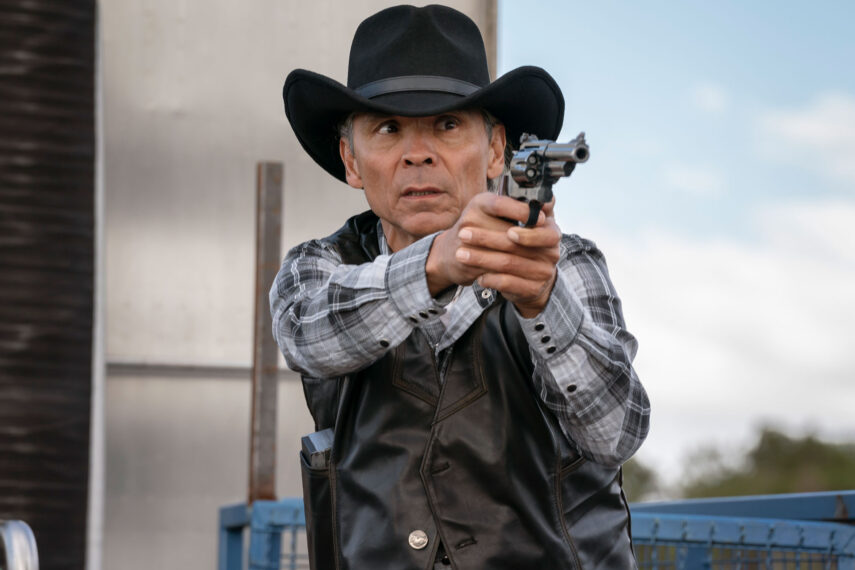
Michael Moriatis / AMC
Bernadette Manuelito (Jessica Matten) was going through hell, too. The former tribal police officer left the force to become a border agent and slowly discovered that many of her new colleagues, including her boss Senior Chief Ed Henry (Terry Serpico), were involved in cross-border drug and human smuggling. Determined to find evidence and turn them in, she only trusted two of the agents: her new boyfriend Ivan Munos (Alex Merez) and her housemate Agent Eleanda Garcia (Tonantzin Carmelo).
She shouldn’t have trusted anyone! A few episodes back, Manuelito discovered among Munos’s possessions a specific type of band wrapped around money that the bad guys used, which was connected to the Spenser organization, run by Tom Spenser [Bruce Greenwood], like Vines, a wealthy oilman, who was behind the smuggling enterprise. She then realizes she can’t trust Munos, but he doesn’t know this. So when he shows up on the season finale to save her from Spenser’s hitman Budge de Baca [Raoul Max Trujillo], who is trying to bury her alive in her truck, she draws a weapon on Munos, and he has to try to explain his way out of it. [Before Munos showed up, her housemate Agent Eleanda Garcia appeared to be helping Manuelito catch the bad guys on a dangerous mission, but instead just as Budge arrived she turned her gun on Manuelito!]
What can you say about Ivan Munos?
His story is very interesting. He’s not an out-and-out black hat guy. He’s resisted being compromised by his boss and Spenser and this gang down at Border Patrol, but he’s had to go along to get along. In his mind, he’s not a bad guy, but in her mind, and this goes back to the nature of her character, because she is such a traditional, forthright person, there’s not a lot of gray area for Bernadette. He’s living in the gray and trying to keep his job because he’s got people at home that he sends money to, so it’s complex for him. But for her, it’s, “You’re either with me or against me.” It was an elegant way to wrap him up. She didn’t slap handcuffs on him or put him in jail, but the power of her righteousness led him to do the right thing, which was go and tell his story to the authorities. I imagine he then might have been charged and have his day in court.
Were there real feelings between them? In their last moments together, he still had hope.
There were, yeah. It was a chance for her, after leaving home, to recreate herself in a new world. She was spreading her wings a bit and allowing herself to get romantically involved with somebody where it was just too complicated on the reservation with [her ex ] Jim Chee, for instance.
There’s a sweet look that passed between Manuelito and Chee, when she’s back at the Rez, having quit the Border Police. Is that a hint that the two of them can start up again?
Yeah. No shortage of chemistry between those two.
Is it fair to say that there was no justice for the rich, evil, white man Spenser at the season’s end?
It was really important to dramatize that a lot of people got taken down that were involved with Spenser’s enterprise but not Spenser himself. He got away to Morrocco or wherever the hell it was with his sick wife. You know, I try to create bad guys that aren’t complete cartoon cutouts, evil people that are ciphers and committed to just committing crimes. I love that idea that Spenser has this whole backstory that he’s very proud of. He tells Bernadette, when he first meets her, about his family’s legacy on this land and their political connections and what oil has done for them. And we see pretty clearly, there’s a lot of oil wells that aren’t pumping. So his way of making a fortune is drying up on him; he doesn’t want to be the last in the long line of Spensers that loses this place, so he concocted this idea about how to make money illicitly and keep the place going and retain his reputation and his good name. But he’s had to compromise a lot of people in order to do that. And at the end of the day, he’s figured out a way that he won’t be touched by the illegal operation. Everybody else gets hurt, but not him. I could say if I was joking with you, I’d say it’s my own perverted view of the world, but the way the world is going now, I don’t think it’s that perverted. [Laughs]
Is there a chance that Spenser, like B.J. Vines, will eventually get his just deserts?
It’s not likely, but never say never. I’m very fond of the actor.
Is there anything else you’d like to say about Season 3?
I’ll just say that Zahn McClarnon was absolutely outdoing himself this season if you’re a fan of his. He’s just magnificent in the show this year. I dragged him through the mud for four months and he loved it. It’s a pleasure to write for him and he raises everything up off the page and he makes the writers look really good.
What can you say about the new season, which is already being filmed? Which of Tony Hillerman’s books is it based on?
The Ghost Way, which is one of my favorite Hillerman novels. It deals with the Navajo experience of ghost sickness, which has to do with what happens to a person, in their tradition, if they are exposed to a dead body or if they’re with a person when the person dies. I’m not a Navajo, and I’m not an expert in all things Navajo, but my understanding is if you are with a person when they breathe their last breath, that breath goes into you and you become ghost sick, which requires a ceremony to cure you of ghost sickness.
Do tell more.
It’s another aspect of Navajo culture, which I personally found very interesting and intriguing and I’m eager to share them with our audience. Many of our writers are indigenous; we have Navajo writers as well as some Navajo consultants. As Zahn likes to say, “We don’t represent the Navajo Nation, but we try to honor the Navajo Nation with an accurate portrayal of their culture and being sensitive to things that are private and not showing the world anything that’s private in the Navajo culture..”
What is Season 4’s major crime case?
Every season I try to look at a different aspect of the white world and how it interfaces with the reservation. It could be a border town — not the border with the United States and Mexico, but with the Navajo Nation. In this case, it’s Los Angeles. We spend three episodes in 1970s LA. The Ghost Way’s story is about a 16-year-old Navajo girl who runs away from boarding school. One of the routine duties of Navajo tribal police is to find runaways and return them to school. It’s been going on for generations.
Were these so-called Indian schools still as bad in the 1970s as they had been for many decades?
They were getting better, not carrying forward the horrible legacy they had in the ’20s, ‘30s, ‘40s, and even possibly ‘50s. They were getting more humane by the ’70s, but still their primary job was to de-native the indigenous people that were their pupils. So this girl runs away and Leaphorn, Chee, and Manuelito go out to Los Angeles to investigate her disappearance. It is rather routine in the beginning, and then it develops into more of a deadly story for her and people around her.
Hadn’t Chee lived in LA at some point? He’d be a good guide to the big city.
Well, yes. When his mother took him from the reservation, they went to Los Angeles.
Dark Winds, Season 4, TBA, AMC


